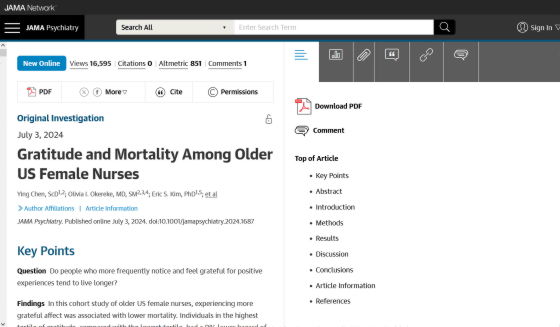Research shows that gratitude is important for longevity

In order to live longer, it is important to exercise moderately, eat a healthy diet, and have hobbies that relieve stress and bring joy. A new study of nearly 50,000 nurses found that having a 'sense of gratitude' is also associated with longer life.
Gratitude and Mortality Among Older US Female Nurses | Nursing | JAMA Psychiatry | JAMA Network

Gratitude may increase longevity among older adults | News | Harvard TH Chan School of Public Health
https://www.hsph.harvard.edu/news/press-releases/experiencing-gratitude-associated-with-greater-longevity-among-older-adults/
Gratitude May Help You Live Longer, Scientists Discover : ScienceAlert
https://www.sciencealert.com/gratitude-may-help-you-live-longer-scientists-discover
'Previous research has shown links between gratitude and a lower risk of psychological distress and improved emotional and social well-being , but the link between gratitude and physical health is less understood,' said lead author Ying Chen of Harvard University.
So Chen and his research team analyzed the results of a survey of elderly nurses in the United States. In this survey, 49,275 elderly female nurses were surveyed in 2016 to measure how grateful they were in their lives and in their lives. The survey asked how much they agreed with six statements, such as 'There are many things in life to be grateful for,' 'If I were to make a list of things I'm grateful for, it would be a very long list,' and 'As I get older, I've become more grateful for the people I've met, the events I've experienced, and the situations I've had in my life.'
A follow-up survey was conducted in 2019 to collect information on the mortality rate and cause of death of the respondents. The average age of the respondents was 79 years old in 2016, and 4,608 people died between the 2016 survey and the 2019 follow-up survey.

The analysis found that people in the top 33% of gratitude scores had a 9% lower risk of dying during the follow-up period compared to those in the bottom 33%. Gratitude was associated with a lower risk of death from any cause, but was particularly associated with a reduced risk of death from cardiovascular disease.
To more precisely quantify the association between gratitude and mortality risk, the team controlled for sociodemographic and medical history, as well as lifestyle factors that are likely to overlap with gratitude, such as social participation, religious involvement, and optimism. Even with this conservative approach, they still found an association between gratitude and reduced mortality.
However, this study only investigated the association and did not prove the causal relationship that gratitude reduces the risk of death. Science Alert, a science media outlet, pointed out that healthy people may simply be more likely to feel gratitude, and that other

The data for this study was primarily from non-Hispanic white women, and the researchers hope to further explore the association between gratitude and mortality in a larger, more diverse group of people.
'Previous research shows that there are ways to intentionally cultivate gratitude, such as writing down or talking about the things you're grateful for several times a week,' said Chen. 'Promoting healthy aging is a public health priority, and we hope that further research will deepen our understanding of gratitude as a psychological resource that enhances longevity.'
Related Posts:
in Science, Posted by log1h_ik







